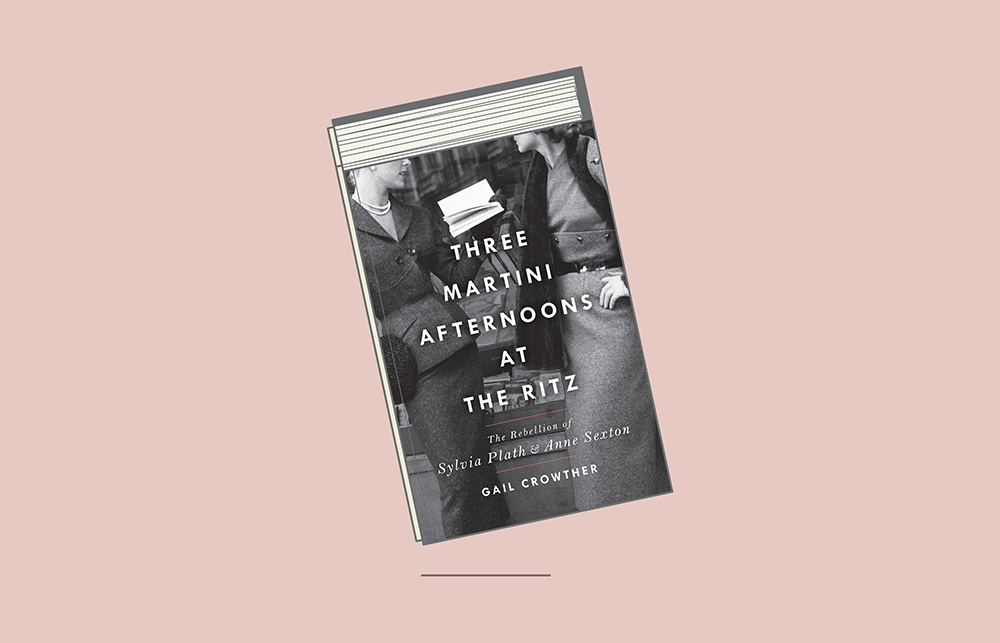今天我们要讲述的是上个世纪两位女性诗人的故事。
在那个年代的美国,大众普遍认为女性不应该有太强的事业心,女生接受教育是为了成为一名更好的妻子。而故事中的两位主人公却对当时的社会主流并不苟同,她们试图在妻子、母亲、作家的多重身份中取得平衡。现实社会的压力与内心真正的想法产生了强烈冲突,她们因此一直活在矛盾之中:作品中的离经叛道,生活中的贤妻良母。
时至今日,职场上的性别歧视和性别平等依旧是社会的热门话题,诸多问题仍亟待解决。两位女性诗人在时代洪流中通过作品发出的微弱呼声延续至今,继续以各种形式推动社会的前进。
在20世纪50年代的美国,大众普遍认为女性不应该有太强的事业心。实际上,“女子无业便是德”的观念占据着统治地位,不追求个人事业、在家安心相夫教子的女性才会在社会上得到敬重。
西尔维娅·普拉斯和安妮·塞克斯顿都出生在这一时期,其性格形成阶段则恰逢“相夫教子”成为社会主流。
普拉斯从史密斯学院毕业时,美国著名政治家阿德莱·史蒂文森在毕业典礼上发表了演讲,在对这些女毕业生表示赞扬的同时,他宣称这些女生接受教育的目的是“成为聪明、有趣的妻子”。
1959年,西尔维亚·普拉斯和安妮·塞克斯顿在罗伯特·洛威尔于波士顿大学开办的诗歌讲习班上首次相遇。作为胸怀抱负的作家,她们都意识到,要想在男性主导的文学界获得成功,自己将会面临巨大的挑战。
在这短短几个月的时间里,二人的生活产生了交集。

周二下课后,塞克斯顿会开着自己的福特牌老爷车,带普拉斯到丽思·卡尔顿酒店喝上三杯马提尼,然后热火朝天地畅谈人生、诗歌、自杀与死亡。塞克斯顿会把车停在装货专用区,然后大声嚷嚷道:“车就停这了,我们就是来往肚子里装货的嘛!”
走进大红色调的酒店酒吧,两人会将书和纸都堆在桌子上,然后就在静谧的氛围中边吃免费薯片边聊天。她们都很清楚,在当时的社会中,要想在妻子、母亲、作家这三种身份之间取得平衡,简直难如登天。
然而两人都有强烈的社会反叛意识,认为女性完全有资格拥有自己的事业。
本文摘录、改编自我写的《三杯马提尼,丽兹酒店的午后时光》(Three-Martini Afternoons at the Ritz),书中探讨了普拉斯和塞克斯顿面临的部分压力,也介绍了两人如何在个人、家庭与事业之间的切换角色。

翻看普拉斯和塞克斯顿的遗物,有样东西会让你有一种反叛社会的感觉,那就是二人的通讯簿。
普拉斯的通讯簿是一本绿色小簿,绘有蛇皮图案,口袋大小,里面是她写下的文字、记的笔记和注释,封面上有“地址”两个浮雕金字。有些地方的黑色墨水字迹依然闪闪发亮,彷佛刚刚写下。
塞克斯顿的地址簿则是一个鲜红色的活页文件夹,依然散发着奇怪的气味。打开收纳盒就能够闻到一股淡淡的尼古丁霉味。塑料封皮摸起来粘粘的,首页上印着一部电话机,原本应该为金色,只是随着岁月变迁,颜色已经逐渐褪去,难以辨认,电话机底座印着的“电话”字样也已经模糊不清。塞克斯顿去世时,这件东西就被放在了她办公桌旁的文件柜上。
和普拉斯一样,塞克斯顿的通讯录对她来说也很重要,她甚至还为其专门写过一首名为《电话》的诗作,诗文开门见山地写道:“红色小簿名为电话,八乘以四尺寸不大。姓名、地址、电话号码,重要的人全都在那。”
虽然诗歌后文娓娓说道:“记在通讯簿中的亲友们的姓名永远不会抹去”,但从塞克斯顿的通讯录可以看出,家人、治疗师、精神病院、自杀热线、药房、期刊、编辑、诗歌评奖委员会及大学的联系方式均紧密地排在一起。
和普拉斯一样,从塞克斯顿的通讯录也能够看出她的交际范围,以及她“家庭主妇兼诗人”的双重人生,或者,就像她所说的那样,除了写诗的时候,“我并不会像诗人那样生活,而是与家庭主妇一般无异”。
她写道,“因为要忙于写诗,我常常会忘记自己还是一名‘正常’的美国家庭主妇,无论是烧菜还是为人妻母,我都不算称职。”
家庭主妇、母亲与诗人角色之间的冲突贯穿了她们的整个职业生涯。但在当时,这种角色定位并不为主流社会所认同。社会普遍期望女性牺牲自己的事业来确保家庭的稳定。
事实上,在比较富裕的家庭中,如果丈夫可以应付家庭开销,而女性仍然坚持外出工作,外界会认为这些女性自私自利,把自己的需求置于家庭需求之上。
在当时,结婚、生子不是个人的私事,这常被认为是美国得以傲立全球的原因之一。冷战时期,美国的全职主妇常常被拿来与在昏暗工厂工作、把孩子扔在阴冷托儿所的苏俄妇女进行对比,以体现美国的优越性。美国的家庭主妇能够精心打扮,专心照看家庭,满足孩子的各种需要。
由于这种宣传,到20世纪50年代,结婚率达到了历史最高水平,女性结婚的年龄也越来越小。
虽然宣传的力量非常强大,但普拉斯和塞克斯顿对此并不买账。
1962年,在写给雕塑家伦纳德·巴斯金的一封信中,普拉斯承认自己之所以还能够应付“人妻、人母的角色及随之而来的各种家务”,只是因为自己还可以写作,而“写作则是我的生命,是我的身体里的血液,是我能够完成家务、照顾子女的力量源泉。虽然母爱是一种天性,但我也需要其他的安慰,让我可以暂时寄情事外”。
塞克斯顿也记录了自己在母亲和女性诗人双重角色下面临的许多困境,并描述了自己与其它家庭主妇格格不入的感觉。
虽然面临诸多问题,但二人一开始都无法完全摆脱社会期望给自己套上的枷锁,在她们的成长过程中,这种期望已经深刻在基因之中。当时的社会氛围也不允许她们与这种价值观进行切割。
普拉斯去世数月之后,第二波女权主义浪潮爆发,但这对普拉斯而言已经为时过晚,令人意外的是,这一事件对塞克斯顿产生的影响也没有想象中的那么大。
不过普拉斯和塞克斯顿的所作所为已经足够离经叛道,在找到发声平台之后,二人的“反叛”行为也越来越公开。在20世纪50年代的美国,特定阶层的女性应该为自己的丈夫牺牲自己的事业,普拉斯和塞克斯顿却并未如此。
两人虽然在诗歌、散文、访谈和通信中变得越来越直言不讳,但在家庭生活中却相当传统,这在某种程度上也是一种平衡。
据其德文郡的邻居玛丽安·福斯特回忆说,尽管本身不感兴趣,但普拉斯每周日还是会坚持去镇上的教堂做礼拜。福斯特问她为什么这么做,普拉斯坦言是因为自己顾虑外界的看法。
但普拉斯当时写的诗歌又带有明显的敌视宗教的色彩,在她1962年发表的短篇小说《母亲们》中,普拉斯对当地那位厌恶女性的虚伪牧师进行了几乎毫不遮掩地揭露。
在给母亲的信中,她更加直截了当地在布道前面加上了“可怕”二字,并表示自己对教区的首席神父极度“蔑视”。
然而即便如此,她依然计划让自己的孩子在那里受洗。
可以说普拉斯过着精神上离经叛道、行为上循规蹈矩的生活。
1962年9月的一天,当普拉斯邀请福斯特夫妇到她家享用精美的下午茶和自制蛋糕时,这对夫妇可不会知道当天早上普拉斯一直在奋笔疾书其声名狼藉的《艾利尔诗集》(Ariel)。
在拒绝传统思想、不做家务方面,塞克斯顿比普拉斯更为大胆一些。
她有时会试着和孩子们一起烤蛋糕,但常常以失败告终。她的丈夫卡约承担了大部分的做饭工作,又另雇了清洁工和洗衣工。
虽然有时塞克斯顿会因为自己未像一般女性那样承担家务工作而表示内疚,但她依然有勇气坚持自己的信念,即她应当有写作的时间,也应该利用好自己的时间进行写作。
普拉斯和塞克斯顿为自己,也为日后那些勇于打破沉默的女性争取到了发声的权利。她们不仅为那些被压迫的女性发出了更响亮的呐喊,更是用自己的声音发起了抗争,为女性开创出一片表达愤怒、厌恶、沮丧和不满的空间,让女性获得了宣泄情绪的权利。
她们还开始以一种令男性编辑、评论家感到震惊和反感的方式描写女性的身体。普拉斯的许多诗作,例如《拉撒路夫人》(Lady Lazarus)、《爸爸》(Daddy)、《申请人》(The Applicant)和《高烧103°》(Fever 103°),均被认为“过于极端,堪称危险”。
而塞克斯顿的许多诗作,比如《堕胎》(The Abortion)、《四十岁月经》(Menstruation at Forty)和《孤独自慰者之歌》(The Ballad of the Lonely Masturbator),则令部分男性评论家勃然大怒,后者随之对塞克斯顿进行了猛烈的攻击和批评,而塞克斯顿则在自己的诗作中予以回击,让那些批评家们越发怒火中烧。
如此一来,普拉斯和塞克斯顿便双双成为当时社会上的麻烦人物。时至今日,这种影响仍未消除。她们的作品所遭受到的那种厌女主义批评在其他作家身上极为少见。这种性别态度也影响到了她们的读者。
长辈会在女孩年少时告诫她们,由于缺少批判能力,读普拉斯的书就像是在“自杀女神”前做礼拜,可能会让她们“走上邪路”。
二人也成了调侃的对象,没有了严肃、认真的读者,有的只是支持其观点的信徒。身着黑色衣服的哥特音乐或情绪摇滚的爱好者。
二人虽然都英年早逝,但其身影却从未消失。她们依然以各种形式存在于这个世界之中。仍然在刊印的书籍、入选各种诗集的诗作让世界依然可以听到她们颠覆性的声音。她们过去是、现在也依然是能够引起共鸣的女性,同时也称得上是才华横溢的诗人。(财富中文网)
Copyright © 2021 by Gail Crowther.改编自最近出版的《三杯马提尼,丽思酒店的午后时光》,作者: 盖尔·克劳瑟,由西蒙与舒斯特公司(Simon & Schuster Inc.)旗下Gallery Books出版社出版。经许可印刷。
译者:梁宇
审校:夏林
今天我们要讲述的是上个世纪两位女性诗人的故事。
在那个年代的美国,大众普遍认为女性不应该有太强的事业心,女生接受教育是为了成为一名更好的妻子。而故事中的两位主人公却对当时的社会主流并不苟同,她们试图在妻子、母亲、作家的多重身份中取得平衡。现实社会的压力与内心真正的想法产生了强烈冲突,她们因此一直活在矛盾之中:作品中的离经叛道,生活中的贤妻良母。
时至今日,职场上的性别歧视和性别平等依旧是社会的热门话题,诸多问题仍亟待解决。两位女性诗人在时代洪流中通过作品发出的微弱呼声延续至今,继续以各种形式推动社会的前进。
在20世纪50年代的美国,大众普遍认为女性不应该有太强的事业心。实际上,“女子无业便是德”的观念占据着统治地位,不追求个人事业、在家安心相夫教子的女性才会在社会上得到敬重。
西尔维娅·普拉斯和安妮·塞克斯顿都出生在这一时期,其性格形成阶段则恰逢“相夫教子”成为社会主流。
普拉斯从史密斯学院毕业时,美国著名政治家阿德莱·史蒂文森在毕业典礼上发表了演讲,在对这些女毕业生表示赞扬的同时,他宣称这些女生接受教育的目的是“成为聪明、有趣的妻子”。
1959年,西尔维亚·普拉斯和安妮·塞克斯顿在罗伯特·洛威尔于波士顿大学开办的诗歌讲习班上首次相遇。作为胸怀抱负的作家,她们都意识到,要想在男性主导的文学界获得成功,自己将会面临巨大的挑战。
在这短短几个月的时间里,二人的生活产生了交集。
周二下课后,塞克斯顿会开着自己的福特牌老爷车,带普拉斯到丽思·卡尔顿酒店喝上三杯马提尼,然后热火朝天地畅谈人生、诗歌、自杀与死亡。塞克斯顿会把车停在装货专用区,然后大声嚷嚷道:“车就停这了,我们就是来往肚子里装货的嘛!”
走进大红色调的酒店酒吧,两人会将书和纸都堆在桌子上,然后就在静谧的氛围中边吃免费薯片边聊天。她们都很清楚,在当时的社会中,要想在妻子、母亲、作家这三种身份之间取得平衡,简直难如登天。
然而两人都有强烈的社会反叛意识,认为女性完全有资格拥有自己的事业。
本文摘录、改编自我写的《三杯马提尼,丽兹酒店的午后时光》(Three-Martini Afternoons at the Ritz),书中探讨了普拉斯和塞克斯顿面临的部分压力,也介绍了两人如何在个人、家庭与事业之间的切换角色。
翻看普拉斯和塞克斯顿的遗物,有样东西会让你有一种反叛社会的感觉,那就是二人的通讯簿。
普拉斯的通讯簿是一本绿色小簿,绘有蛇皮图案,口袋大小,里面是她写下的文字、记的笔记和注释,封面上有“地址”两个浮雕金字。有些地方的黑色墨水字迹依然闪闪发亮,彷佛刚刚写下。
塞克斯顿的地址簿则是一个鲜红色的活页文件夹,依然散发着奇怪的气味。打开收纳盒就能够闻到一股淡淡的尼古丁霉味。塑料封皮摸起来粘粘的,首页上印着一部电话机,原本应该为金色,只是随着岁月变迁,颜色已经逐渐褪去,难以辨认,电话机底座印着的“电话”字样也已经模糊不清。塞克斯顿去世时,这件东西就被放在了她办公桌旁的文件柜上。
和普拉斯一样,塞克斯顿的通讯录对她来说也很重要,她甚至还为其专门写过一首名为《电话》的诗作,诗文开门见山地写道:“红色小簿名为电话,八乘以四尺寸不大。姓名、地址、电话号码,重要的人全都在那。”
虽然诗歌后文娓娓说道:“记在通讯簿中的亲友们的姓名永远不会抹去”,但从塞克斯顿的通讯录可以看出,家人、治疗师、精神病院、自杀热线、药房、期刊、编辑、诗歌评奖委员会及大学的联系方式均紧密地排在一起。
和普拉斯一样,从塞克斯顿的通讯录也能够看出她的交际范围,以及她“家庭主妇兼诗人”的双重人生,或者,就像她所说的那样,除了写诗的时候,“我并不会像诗人那样生活,而是与家庭主妇一般无异”。
她写道,“因为要忙于写诗,我常常会忘记自己还是一名‘正常’的美国家庭主妇,无论是烧菜还是为人妻母,我都不算称职。”
家庭主妇、母亲与诗人角色之间的冲突贯穿了她们的整个职业生涯。但在当时,这种角色定位并不为主流社会所认同。社会普遍期望女性牺牲自己的事业来确保家庭的稳定。
事实上,在比较富裕的家庭中,如果丈夫可以应付家庭开销,而女性仍然坚持外出工作,外界会认为这些女性自私自利,把自己的需求置于家庭需求之上。
在当时,结婚、生子不是个人的私事,这常被认为是美国得以傲立全球的原因之一。冷战时期,美国的全职主妇常常被拿来与在昏暗工厂工作、把孩子扔在阴冷托儿所的苏俄妇女进行对比,以体现美国的优越性。美国的家庭主妇能够精心打扮,专心照看家庭,满足孩子的各种需要。
由于这种宣传,到20世纪50年代,结婚率达到了历史最高水平,女性结婚的年龄也越来越小。
虽然宣传的力量非常强大,但普拉斯和塞克斯顿对此并不买账。
1962年,在写给雕塑家伦纳德·巴斯金的一封信中,普拉斯承认自己之所以还能够应付“人妻、人母的角色及随之而来的各种家务”,只是因为自己还可以写作,而“写作则是我的生命,是我的身体里的血液,是我能够完成家务、照顾子女的力量源泉。虽然母爱是一种天性,但我也需要其他的安慰,让我可以暂时寄情事外”。
塞克斯顿也记录了自己在母亲和女性诗人双重角色下面临的许多困境,并描述了自己与其它家庭主妇格格不入的感觉。
虽然面临诸多问题,但二人一开始都无法完全摆脱社会期望给自己套上的枷锁,在她们的成长过程中,这种期望已经深刻在基因之中。当时的社会氛围也不允许她们与这种价值观进行切割。
普拉斯去世数月之后,第二波女权主义浪潮爆发,但这对普拉斯而言已经为时过晚,令人意外的是,这一事件对塞克斯顿产生的影响也没有想象中的那么大。
不过普拉斯和塞克斯顿的所作所为已经足够离经叛道,在找到发声平台之后,二人的“反叛”行为也越来越公开。在20世纪50年代的美国,特定阶层的女性应该为自己的丈夫牺牲自己的事业,普拉斯和塞克斯顿却并未如此。
两人虽然在诗歌、散文、访谈和通信中变得越来越直言不讳,但在家庭生活中却相当传统,这在某种程度上也是一种平衡。
据其德文郡的邻居玛丽安·福斯特回忆说,尽管本身不感兴趣,但普拉斯每周日还是会坚持去镇上的教堂做礼拜。福斯特问她为什么这么做,普拉斯坦言是因为自己顾虑外界的看法。
但普拉斯当时写的诗歌又带有明显的敌视宗教的色彩,在她1962年发表的短篇小说《母亲们》中,普拉斯对当地那位厌恶女性的虚伪牧师进行了几乎毫不遮掩地揭露。
在给母亲的信中,她更加直截了当地在布道前面加上了“可怕”二字,并表示自己对教区的首席神父极度“蔑视”。
然而即便如此,她依然计划让自己的孩子在那里受洗。
可以说普拉斯过着精神上离经叛道、行为上循规蹈矩的生活。
1962年9月的一天,当普拉斯邀请福斯特夫妇到她家享用精美的下午茶和自制蛋糕时,这对夫妇可不会知道当天早上普拉斯一直在奋笔疾书其声名狼藉的《艾利尔诗集》(Ariel)。
在拒绝传统思想、不做家务方面,塞克斯顿比普拉斯更为大胆一些。
她有时会试着和孩子们一起烤蛋糕,但常常以失败告终。她的丈夫卡约承担了大部分的做饭工作,又另雇了清洁工和洗衣工。
虽然有时塞克斯顿会因为自己未像一般女性那样承担家务工作而表示内疚,但她依然有勇气坚持自己的信念,即她应当有写作的时间,也应该利用好自己的时间进行写作。
普拉斯和塞克斯顿为自己,也为日后那些勇于打破沉默的女性争取到了发声的权利。她们不仅为那些被压迫的女性发出了更响亮的呐喊,更是用自己的声音发起了抗争,为女性开创出一片表达愤怒、厌恶、沮丧和不满的空间,让女性获得了宣泄情绪的权利。
她们还开始以一种令男性编辑、评论家感到震惊和反感的方式描写女性的身体。普拉斯的许多诗作,例如《拉撒路夫人》(Lady Lazarus)、《爸爸》(Daddy)、《申请人》(The Applicant)和《高烧103°》(Fever 103°),均被认为“过于极端,堪称危险”。
而塞克斯顿的许多诗作,比如《堕胎》(The Abortion)、《四十岁月经》(Menstruation at Forty)和《孤独自慰者之歌》(The Ballad of the Lonely Masturbator),则令部分男性评论家勃然大怒,后者随之对塞克斯顿进行了猛烈的攻击和批评,而塞克斯顿则在自己的诗作中予以回击,让那些批评家们越发怒火中烧。
如此一来,普拉斯和塞克斯顿便双双成为当时社会上的麻烦人物。时至今日,这种影响仍未消除。她们的作品所遭受到的那种厌女主义批评在其他作家身上极为少见。这种性别态度也影响到了她们的读者。
长辈会在女孩年少时告诫她们,由于缺少批判能力,读普拉斯的书就像是在“自杀女神”前做礼拜,可能会让她们“走上邪路”。
二人也成了调侃的对象,没有了严肃、认真的读者,有的只是支持其观点的信徒。身着黑色衣服的哥特音乐或情绪摇滚的爱好者。
二人虽然都英年早逝,但其身影却从未消失。她们依然以各种形式存在于这个世界之中。仍然在刊印的书籍、入选各种诗集的诗作让世界依然可以听到她们颠覆性的声音。她们过去是、现在也依然是能够引起共鸣的女性,同时也称得上是才华横溢的诗人。(财富中文网)
Copyright © 2021 by Gail Crowther.改编自最近出版的《三杯马提尼,丽思酒店的午后时光》,作者: 盖尔·克劳瑟,由西蒙与舒斯特公司(Simon & Schuster Inc.)旗下Gallery Books出版社出版。经许可印刷。
译者:梁宇
审校:夏林
In 1950s America, women were not supposed to be ambitious. In fact, women were respected for not pursuing their own careers and instead focusing their attentions on the home and family.
Sylvia Plath and Anne Sexton were born into this cultural moment and reached their formative years when this ideology of the dutiful woman was at its height. When Plath graduated from Smith College, her commencement speaker, Adlai Stevenson, praised the female graduates and pronounced that the purpose of their education was to help them become intelligent, interesting wives.
But in 1959, Sylvia Plath and Anne Sexton met for the first time at a poetry workshop run by Robert Lowell at Boston University. They were both aware of the challenges facing them as aspiring writers trying to get ahead and be successful in a male-dominated literary discipline. For this short period of time, a matter of months, the two women’s lives collided.
On a Tuesday after class Sexton would drive them to The Ritz-Carlton in her old Ford to drink three martinis and talk intensely about life, poetry, suicide, and death. Pulling up in a Loading Only zone, Sexton would yell “It’s okay, because we are only going to get loaded!” Then, over dishes of free potato chips in the hushed, red hotel bar they would pile their books and papers on the table, and talk. Both understood the tensions and challenges of trying to negotiate their way through the world balancing their desire to be wives, mothers, and writers. Both had a strong sense of social rebellion and a belief that women were more than entitled to their own careers.
This extract adapted from my book, Three-Martini Afternoons at the Ritz begins to explore some of these tensions and how Plath and Sexton found their lives a juggling act between the personal, domestic, and professional.
*****
There are two items in the Plath and Sexton archives that evoke a sense of social rebellion. Their address books.
Plath’s is a green snakeskin-patterned pocket-sized book filled mostly with her immaculate handwriting, notes, and annotations. The front cover has the word Addresses on it in embossed gold lettering. The black ink is shiny in places, almost wet looking. Sexton’s is a loose-leafed vibrant red folder that still retains an odd odor. When the archive storage box is opened, it exudes a faint smell of musty nicotine. The plastic cover is sticky to the touch. The front page has a vague imprint of the word Telephone engraved around the bottom of a square plinth holding a picture of what looks to be a once-gold tele- phone. This item was left on the top of Sexton’s filing cabinet by her desk at the time of her death.
Like Plath, Sexton’s address book was important to her, so important that she wrote a poem about it called “Telephone,” beginning with a clear, accurate description: “Take a red book called TELEPHONE, / Size eight by four. There it sits. / My red book, name, address and number. / These are all people that I somehow own.”
While the poem then muses upon all the “dear dead names” that “won’t erase” from the book, what we can see in Sexton’s list of contacts is how closely family, therapists, psychiatric hospitals, suicide hotlines, and pharmacies sit side by side with journals, editors, poetry prize committees, and university contacts. As with Plath’s address book, Sexton’s showed the range of people she was dealing with and the almost double life of housewife-poet, or, as she put it, “I do not live a poet’s life. I look and act like a housewife” until the point when a poem has to be written and then, she writes, “I am a lousy cook, a lousy wife, a lousy mother, because I am too busy wrestling with the poem to remember that I am a normal (?) American housewife.”
The tension of these two areas running alongside each other, the housewife-mother and the professional poet, was one that both women felt throughout their careers. But it was a position that was frowned upon at the time. Women were expected to sacrifice their careers to ensure a stable home. In fact, in more affluent homes, if women chose to work when the paycheck was not needed, they were regarded as selfish for putting their own needs before those of the family. Marriage and children were part of the national agenda and regarded as one feature that made America superior. Operating within the Cold War agenda, stay-at-home mothers were contrasted favorably with mothers in communist Russia who worked in dismal factories and left their children in cold day-care centers. American wives could be well-groomed, focusing on orderly homes and tending to all their children’s needs. As a result of this propaganda, by the 1950s marriage rates were at an all- time high, and women were getting married younger.
Despite the power of this message, neither Plath nor Sexton could fully accept this cultural norm. In 1962, in a candid letter to the sculptor Leonard Baskin, Plath admitted that she was only able to cope with being a wife and mother and all the domestic chores that came with it because she could also write, “which is my life blood & makes it possible for me to be domes- tic & motherly, which latter is my nature some of the time, & only when I have the other consolations & reprieves.”
Sexton, too, records on numerous occasions the tension of being a woman as both poet and mother and how she felt displaced among other suburban housewives of the time. And yet neither could, at first, fully reject the societal expectations that formed part of their upbringing. Neither was there really a precedent yet that would support their breaking away from such domestic ideals. That would come too late for Plath, who died just months before the advent of second-wave feminism, a movement that surprisingly did not sweep Sexton up to the extent one might expect.
What Plath and Sexton did try to achieve was a subversive rebellion that increasingly became an open rebellion as they found their voices and their platforms from which to speak. If in 1950s America women of a certain class were supposed to sacrifice their own careers for those of their husbands, Plath and Sexton were having none of it. Both became increasingly outspoken in their poetry, prose, interviews, and correspondence while somehow balancing this against staying fairly conventional in their home lives.
Marian Foster, a Devon neighbor, recalls how Plath insisted on going to the Sunday church services in town even though she despised them. When Foster asked her why she persisted, Plath admitted that she was concerned about what people would think if she didn’t attend. Yet Plath’s poems at that time are markedly hostile to religion, and her 1962 short story “Mothers” does little to disguise the local vicar whom Plath exposes as misogynistic and hypocritical. In a letter to her mother she was even more open about the “ghastly sermons” and the rector for whom she was full of “scorn."
Yet she still planned to have her children christened there. This rebellion and conformity ran in uneasy conjunction, often bumping into each other. In September 1962, when Plath invited the Fosters to her home for genteel afternoon tea and homemade cakes, they had no idea that that morning she had been furiously writing her infamous Ariel poems.
Sexton was slightly more daring than Plath in her rejection of conventional ideals and domestic chores. She sometimes tried to bake cakes with the children, but they often went wrong. Kayo, her husband, did most of the cooking. She employed a cleaner and someone to do the laundry. While Sexton occasionally expressed some guilt about this seeming domestic aberration from the expected norm, she also had the courage to stand by her belief that she deserved the time to write and would take it and use it.
What Plath and Sexton established was a position that would last for the rest of their lives and afterlives—that of women who refuse to be silent. Their voices were not just asserting some louder version of the oppressed female experience; their voices were confrontational and started to open up a space for women to express anger, disgust, frustration, and dissatisfaction. Rage became legitimized. They also began writing about the female body in a way that caused genuine shock and revulsion among male editors and critics. Plath’s poems, such as "Lady Lazarus,” “Daddy,” “The Applicant,” and “Fever 103°,” were regarded as dangerously extreme. Sexton’s poems, such as “The Abortion,” “Menstruation at Forty,” and “The Ballad of the Lonely Masturbator,” sent some male critics into apoplectic rage—rage and criticism that Sexton then took on and replied back to in her poems, which presumably left the critics even more paralyzed with fury.
The result was that Plath and Sexton were, and still are, regarded as both troubling and troublesome figures in society. Their work is subjected to the kind of misogynistic critique rarely heaped on other writers. And this gendered attitude filters down to their readers too. Young women are told they’ll “grow out” of reading Plath, that they lack any critical faculties, merely worship at the shrine of a suicide death goddess, and so on. They become objects of humor, no longer proper or serious readers, but rather devotees. Goths and emos who wear black with a death fixation.
Although both died young, Plath and Sexton have never really gone away. This presence is around in a number of ways. Their books remain in print, and their poems anthologized, ensuring their disruptive voices are still heard. They were, and remain, relatable women, if extraordinarily gifted poets.
Copyright © 2021 by Gail Crowther. Adapted from the recently published Three-Martini Afternoons at the Ritz by Gail Crowther, published by Gallery Books, a division of Simon & Schuster, Inc. Printed by permission.






